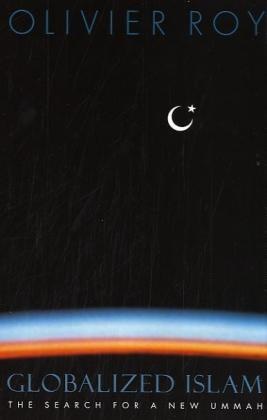Condividi
Fr. 135.00
Olivier Roy
Globalized Islam - The Search For a New Ummah
Inglese · Copertina rigida
Spedizione di solito entro 3 a 5 settimane (il titolo viene procurato in modo speciale)
Descrizione
The spread of Islam around the globe has blurred the connection between a religion, a specific society, and a territory. One-third of the world's Muslims now live as members of a minority. At the heart of this development is, on the one hand, the voluntary settlement of Muslims in Western societies and, on the other, the pervasiveness and influence of Western cultural models and social norms. The revival of Islam among Muslim populations in the last twenty years is often wrongly perceived as a backlash against westernization rather than as one of its consequences. Neofundamentalism has been gaining ground among a rootless Muslim youth -- particularly among the second- and third-generation migrants in the West -- and this phenomenon is feeding new forms of radicalism, ranging from support for Al Qaeda to the outright rejection of integration into Western society.
In this brilliant exegesis of the movement of Islam beyond traditional borders and its unwitting westernization, Olivier Roy argues that Islamic revival, or "re-Islamization," results from the efforts of westernized Muslims to assert their identity in a non-Muslim context. A schism has emerged between mainstream Islamist movements in the Muslim world -- including Hamas of Palestine and Hezbollah of Lebanon -- and the uprooted militants who strive to establish an imaginary ummah, or Muslim community, not embedded in any particular society or territory. Roy provides a detailed comparison of these transnational movements, whether peaceful, like Tablighi Jama'at and the Islamic brotherhoods, or violent, like Al Qaeda. He shows how neofundamentalism acknowledges without nostalgia the loss of pristine cultures, constructing instead a universal religious identity that transcends the very notion of culture. Thus contemporary Islamic fundamentalism is not a single-note reaction against westernization but a product and an agent of the complex forces of globalization.
Sommario
Preface 1. Introduction: Islam: A Passage to the WestThe failure of political Islam: and what?Islam as a minorityAcculturation and 'objectification' of IslamRecasting identities, westernising religiosityWhere are the Muslim reformers?Crisis of authority and self-enunciationReligion as identityThe triumph of the selfSecularisation through religion?Is jihad closer to Marx than to the Koran?What is Bin Laden's stategy? 2. Post-IslamismThe failure of political Islam revisitedFrom Islamism to nationalismStates without nation, brothers and stateThe crisis of diasporasIslam is never a stretegic factor as suchThe political integratoin of IslamistsFrom utopia to conservatismThe elusive 'Muslim vote'Democracy without democratsThe Iranian Islamic revolution: how politics defines religionIslamisation as a factor secularisationConservative re-IslamisationPost-Islamism: the privatisation of religion 3. Muslims in the WestHow to live as a sateless Muslim minorityHistorical paradigms of Muslims as a minorityAcculturation and identity reconstruction 4. The Triumph of hte Religios SelfThe loss of religious authority and the 'objectification' of IslamImmigration and reformulation of IslamThe crisis of authority and religious knowledgeThe religious market and the sociology of Islamic actorsIndividualisation of enunciation and propagandaFaith and selfHumanism, ethical Islam and salvationEnunciation of the selfRecommunitarisation and construction of identity 5. Islam in the West or the Westernisation of IslamThe building of Muslim 'churches'Neo-brohterhoos and New Age religiosity 6. The Modernity of an Archaic Way of Thinking: NeofundamentalismSources and actors of neofundamentalismThe basic tenets of neofundamentalismNeofundamentalists and IslamistsNeofundamentalists and radical violenceWhy is neofundamentalism successful?The new frontier of the imagined ummah 7. On the Path to War: Bin Laden and OthersAl Qaeda and the new terroristsDeterritorialisationRe-islamisation in the West Uprooting and acculturationThe peripheral jihadThe Western-born or second-generation MuslimsThe converts and the 'protest conversion'The subcontractorsThe future of Al Qaeda 8. Remapping the World: Civilisation, Religion and StrategyCulture, religion and civilisations: the conundrum of clash and dialogueThe debate on valuesMilitary strategy on abstract territories Index
Info autore
Olivier Roy ist Forschungsdirektor am Centre National de la Recherche Scientifique (CNRS) und unterrichtet an der Ecole des Hautes Etudes en Sciences Sociales und an der Sciences Po in Paris. Er hat zahlreiche Bücher und Aufsätze über den politischen Islam, den islamistischen Terrorismus sowie den Mittleren und Nahen Osten veröffentlicht. Sein Buch "Der islamische Weg nach Westen" (2006) wurde zu einem häufig zitierten Standardwerk. Olivier Roy ist ein weltweit gefragter Islamismus-Experte.
Riassunto
Argues that Islamic revival, or "re-Islamization," results from the efforts of westernized Muslims to assert their identity in a non-Muslim context. This book provides a comparison of several transnational movements, whether peaceful, like Tablighi Jama'at and the Islamic brotherhoods, or violent, like Al Qaeda.
Dettagli sul prodotto
| Autori | Olivier Roy |
| Editore | Columbia University Press |
| Lingue | Inglese |
| Formato | Copertina rigida |
| Pubblicazione | 01.01.2004 |
| EAN | 9780231134989 |
| ISBN | 978-0-231-13498-9 |
| Pagine | 320 |
| Peso | 550 g |
| Serie |
The CERI Series in Comparative Politics & International Studies CERI Series in Comparative Pol CERI Series in Comparative Pol The CERI Series in Comparative Politics and International Studies |
| Categorie |
Scienze sociali, diritto, economia
> Scienze politiche
> Teorie politiche e storia delle idee
Scienze umane, arte, musica > Storia > Storia contemporanea (dal 1945 al 1989) |
Recensioni dei clienti
Per questo articolo non c'è ancora nessuna recensione. Scrivi la prima recensione e aiuta gli altri utenti a scegliere.
Scrivi una recensione
Top o flop? Scrivi la tua recensione.

